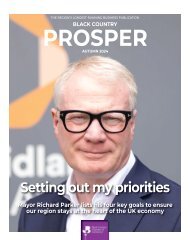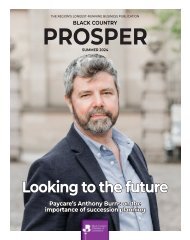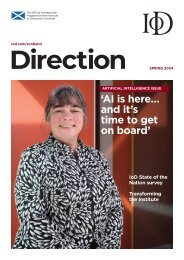IoD Scotland Autumn 2021
Institute of Directors Scotland, business magazine, directors
Institute of Directors Scotland, business magazine, directors
Create successful ePaper yourself
Turn your PDF publications into a flip-book with our unique Google optimized e-Paper software.
<strong>IoD</strong> <strong>Scotland</strong> events: Global Conference<br />
Drive the agenda and make<br />
Net Zero your destination<br />
PlanetMark sets a sustainability standard to chart your progress<br />
The <strong>IoD</strong> is proud to be a supporter of<br />
PlanetMark – the business certification<br />
scheme that recognises an organisation’s<br />
commitment to continuous improvement<br />
on environmental issues, including<br />
measuring and reducing carbon<br />
emissions, energy and water<br />
consumption, travel and waste.<br />
PlanetMark’s goal, explained Lilly<br />
Miller, its Chief Financial Officer, was to<br />
change the focus on to people and<br />
inspire them to make the shift to<br />
practices that have sustainability,<br />
fairness and equality at their heart.<br />
There was no silver bullet to achieve<br />
PlanetMark certification; rather than a<br />
perfect solution, organisations should<br />
take small steps that together, impact on<br />
key environmental and wellbeing indices.<br />
PlanetMark’s certification programme<br />
can unleash the passion of employees to<br />
make a difference and can be a major<br />
tool in increasing staff retention,<br />
employee and stakeholder engagement<br />
and attract new people and business.<br />
Key to unlocking this potential were<br />
finance directors, who Lilly suggested,<br />
could be renamed as ‘sustainability<br />
directors’ in the future, as their role put<br />
them in charge of an organisation’s<br />
environmental performance.<br />
Find out more about Planet Mark at<br />
https://www.planetmark.com<br />
Lilly Miller<br />
“FDs are routinely tasked with<br />
identifying future risks that threaten the<br />
business,” Lilly said. “But of the top 10<br />
risks businesses face, six are linked to<br />
environmental issues, so shouldn’t an FD<br />
be controlling this side of your business?”<br />
Performance needed to be directly<br />
linked to environmental impacts. Start<br />
by tackling what you can measure:<br />
business travel, waste and water and<br />
energy usage, and take simple steps<br />
such as switching to renewable power.<br />
Set a carbon footprint baseline and<br />
use that as a starting point, with regular<br />
board updates on progress.<br />
It was vital that this exercise goes<br />
through your supply chain; challenge<br />
stakeholders on their own operations as<br />
there was little point presenting an environmentally-friendly<br />
face when your supply<br />
chain is failing to match your own progress.<br />
“Businesses have a role in driving this<br />
agenda,” Lilly stressed. “Legislation is<br />
usually too slow and faces multiple<br />
hurdles from vested interests. You<br />
however, can take a lead and drive change<br />
through your own practices and what you<br />
expect from your stakeholders.”<br />
Engineering solutions for the future<br />
Martyn Link, Chief Strategy Officer,<br />
Wood, in conversation with <strong>IoD</strong><br />
<strong>Scotland</strong> Chair Aidan O’Carroll<br />
In a Conference Challenge session<br />
compered by Aidan O’Carroll, Martyn Link<br />
highlighted the huge strides engineering<br />
giant Wood had made in pivoting its<br />
operations away from oil and gas<br />
as it looked to “engineer<br />
solutions for Net Zero.”<br />
As a global business Wood<br />
understood that the current<br />
focus on climate change<br />
action was in the Global<br />
North, but the<br />
repercussions were being<br />
felt most keenly in the South.<br />
‘One size fits all’ strategies<br />
would not work. “You have to<br />
32 iod.com<br />
Martyn Link<br />
engage with people in a way that’s<br />
meaningful to them,” said Martyn, and<br />
that’s true of “your workforce, stakeholders<br />
or the communities you work with.”<br />
Offsetting its legacy business was<br />
“stretching Wood as an organisation”, but<br />
the cultural shift, which saw it asking<br />
tough questions of all of its operations,<br />
was paying dividends. Tackling<br />
climate change was now<br />
embedded into Wood’s culture<br />
and vision – “it is our North<br />
Star.”<br />
Pace of change could be<br />
frustratingly slow but<br />
despite having to take big<br />
steps into the unknown, “we<br />
are committed to<br />
sustainability”, despite the<br />
tensions that it creates in any<br />
business with aspirations for growth.<br />
“We are very aware that we have a<br />
responsibility to our shareholders but we<br />
also know we have a responsibility to<br />
those of the future: will they want to<br />
invest in Wood?”<br />
The future for Wood would be very<br />
different from its past and present. It was<br />
investing heavily in its Energy Transition<br />
Academy to retrain employees into the<br />
renewables sector, while looking for new<br />
solutions and bringing them to market.<br />
Enormous change was coming, and<br />
Wood was determined to be a force for<br />
good in the landscape that evolved.<br />
However, understanding your role in the<br />
society of the future was critical: “If you<br />
can’t articulate your future, how can you<br />
play a part in it?”<br />
<strong>Autumn</strong> <strong>2021</strong>

















